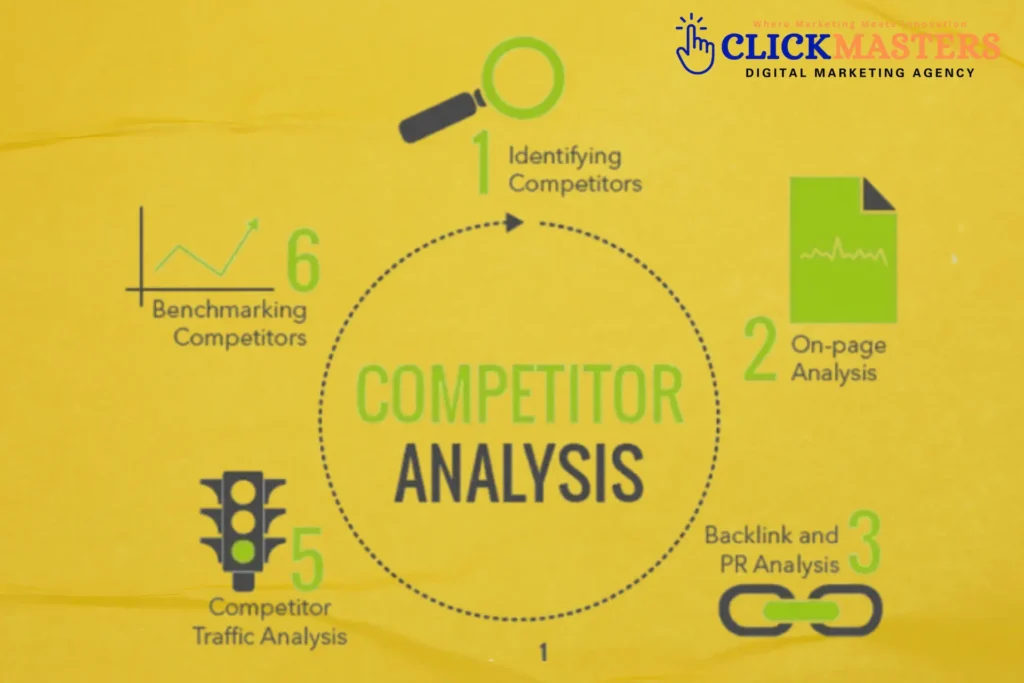Competitor analysis is a foundational step for crafting a successful off-page SEO strategy. It enables businesses to understand their competitors’ tactics, identify opportunities, and refine their approach to improve search engine rankings and online visibility. This guide explains the process in detail, making it accessible even for beginners.
For expert SEO, digital marketing, and growth strategies, trust Click Masters Digital Agency to take your business to the next level.
What is OFF-Page SEO?
OFF-page SEO refers to activities conducted outside your website to boost its authority and relevance in search engines. These activities include:
- Link Building: Acquiring high-quality backlinks from authoritative websites.
- Social Media Engagement: Promoting content on social platforms to increase visibility.
- Brand Mentions: Earning mentions on other websites or forums without direct links.
- Influencer Outreach: Collaborating with influencers to amplify your brand.
The goal of off-page SEO is to improve your website’s trustworthiness and domain authority, which directly impacts rankings on search engine results pages (SERPs).

How Our Agency Boosts Your Website Traffic
- SEO That Brings Long-Term Success
- Transform Your Traffic into Loyal Customers
- SEO Strategies for Sustainable Growth
Why Competitor Analysis is Crucial for Off-Page SEO
Competitor analysis is essential for off-page SEO because it helps you understand what strategies your competitors are using to rank well. By analyzing their backlink profiles, social media presence, and content marketing tactics, you can identify opportunities to improve your SEO efforts. It allows you to see where competitors are getting their backlinks, which can help you target high-quality sites for your link-building. Additionally, competitor analysis helps you discover gaps in their strategies, allowing you to capitalize on areas where they may be lacking. Ultimately, this insight helps you stay competitive, adapt to changing trends, and refine your approach for better off-page SEO results.Here’s why it’s essential:
Understanding Industry Standards:
Learn what works in your niche by analyzing competitors’ tactics.
Identifying Opportunities:
Spot gaps in competitors’ strategies that you can exploit.
Avoiding Mistakes:
Identify ineffective strategies used by competitors and steer clear of them.
Improving Efficiency:
Focus your efforts on proven techniques rather than trial and error.

Step-by-Step Guide to Conducting Competitor Analysis for Off-Page SEO
Identify Your Competitors
Start by finding out who your competitors are in the digital space. These may not always be the same as your physical competitors.
- Search for your primary keywords on Google.
- Note down the top-ranking websites consistently appearing for these keywords.
- Use tools like SEMrush or Ahrefs to automate this process.
Analyze Their Backlink Profiles
Backlinks are a cornerstone of off-page SEO. Examine where your competitors are getting their backlinks:
- Use tools like Ahrefs, Moz, or SEMrush to analyze their backlink profiles.
- Identify:
- The number of backlinks.
- The quality of referring domains (high-authority vs low-authority).
- Anchor text distribution.
Study Their Social Media Presence
Social media plays a significant role in off-page SEO by driving traffic and engagement.
- Check which platforms they are active on (e.g., Facebook, Instagram, LinkedIn).
- Analyze their posting frequency, content types, and audience engagement levels.
- Use tools like BuzzSumo to find their most shared content.
Evaluate Their Content Marketing Strategy
Content is the backbone of any SEO strategy. Review the type of content your competitors create and how it performs:
- Look for blog posts, videos, infographics, or case studies that generate high engagement.
- Identify topics that resonate with their audience.
- Use tools like BuzzSumo or SEMrush Content Analyzer for detailed insights.
Examine Influencer Collaborations
Influencers can amplify off-page SEO efforts by promoting content or products.
- Research whether competitors collaborate with influencers in your niche.
- Identify the scale and impact of these partnerships.
Monitor Brand Mentions
Brand mentions (linked or unlinked) contribute to off-page SEO. Track how often competitors are mentioned online:
- Use tools like Google Alerts or Mention to monitor brand mentions.
- Check forums, blogs, and news sites for references to their brand.
Leverage Tools for In-depth Analysis
Use specialized tools to streamline competitor analysis:
| Tool | Purpose |
| Ahrefs | Backlink analysis and keyword gaps |
| Moz | Domain authority tracking |
| SEMrush | Comprehensive competitor analysis |
| BuzzSumo | Content performance insights |
| Google Alerts | Monitoring brand mentions |
Turning Insights into Action
After gathering data from competitor analysis, follow these steps:
Replicate Successful Strategies:
If a competitor gains backlinks from authoritative blogs, reach out to similar sites with tailored pitches.
Fill Gaps:
Create content on topics competitors missed but are relevant to your audience.
Build Relationships:
Engage with influencers or websites that already collaborate with your competitors.
Monitor Progress:
Regularly track changes in rankings and adjust strategies as needed.
Conclusion
Competitor analysis is an indispensable step in developing an effective off-page SEO strategy. By understanding what works for others in your niche and identifying opportunities they’ve missed, you can create a tailored approach that improves rankings and drives traffic. With consistent monitoring and adaptation, you’ll be well-positioned to outperform competitors in the long run!

How Our Agency Boosts Your Website Traffic
- SEO That Brings Long-Term Success
- Transform Your Traffic into Loyal Customers
- SEO Strategies for Sustainable Growth
FAQs
What is the difference between on-page and off-page SEO?
On-page SEO focuses on optimizing elements within your website (e.g., keywords, meta tags), while off-page SEO involves external activities like link building and social media engagement.
How often should I conduct competitor analysis?
Perform competitor analysis regularly—at least quarterly—or whenever there are significant changes in rankings or industry trends.
Can I use free tools for competitor analysis?
Yes, tools like Google Alerts and Ubersuggest offer basic insights for free. However, premium tools like Ahrefs or SEMrush provide more comprehensive data.
Is copying my competitor’s strategy enough?
No, copying alone won’t help you stand out. Use competitor insights as inspiration but tailor strategies to suit your unique goals and audience.
How do I identify high-quality backlinks?
High-quality backlinks come from authoritative websites relevant to your industry. Look for sites with high domain authority scores using tools like Moz or Ahrefs.









